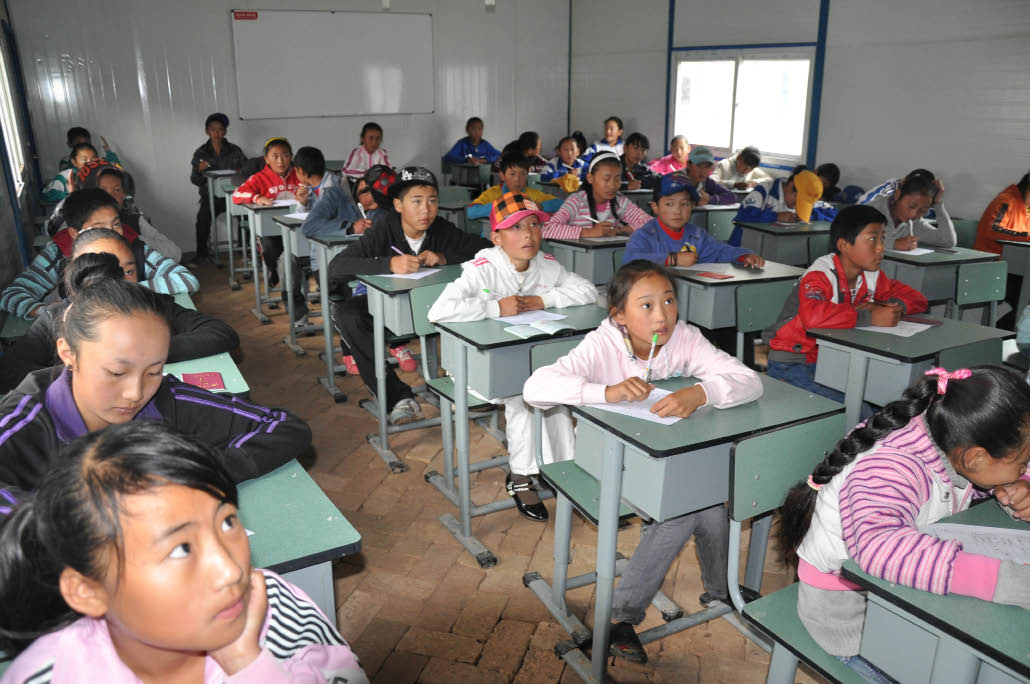|
Disaster Relief, Long Term
Earthquake-affected Students Studying in Beijing
By staff reporter HOU RUILI
ON April 14 this year, to mark the second anniversary of the Yushu earthquake and honor lost families and friends, 162 Tibetan students from disaster-affected areas in Qinghai Province held a series of activities at the Experimental School Attached to Peking University. These students, who now call Beijing home, aim to venerate their lost ones by excelling in their new scholastic environment at the Experimental School, so-called owing to its rigorous curriculum and high educational standards. Compared to the scene at last year's commemorative ceremony, the Tibetan students seemed more relaxed, reflective and confident about their future. Big thanks go to their school and its dedicated teachers.
 |
|
Students in Yushu sit a test for the chance to study in Beijing. One of the girls, Songyai Melha, performed well enough to be selected, and has excelled during her stay in Beijing. Photos courtesy of Wang Quanzhong |
Teaching Approach With a Difference
The Experimental School Attached to Peking University was founded as a private school by Beida Jade Bird Group, a hi-tech company owned by the university. Dong Qi, the group's vice president, is the headmaster of the school. In Dong's opinion, one of a school's major tasks is to guide children's happy development into adulthood.
Two years ago, Yushu, a county with a population that is 90 percent Tibetan, was completely flattened by a cataclysmic earthquake. Local students were transferred to other regions around China to continue their study as schools in their hometown were rebuilt. A total of 162 students ended up at the Experimental School Attached to Peking University.
These students had never learned English and performed poorly in math and Chinese in comparison with their Beijing schoolmates. To help them speedily improve their academic performance, teachers at the Experimental School grouped them into "teams" consisting of five members each. In each group of five, the more advanced students were expected to help those lagging behind.
Songyai Melha, in grade two of the middle school, was very timid when she arrived in Beijing at age 11. At first, she struggled with math, and couldn't keep up with her new class. Her teacher called on classmates to encourage her and help her review lessons. Today, she ranks solidly among her classmates in tests. Her mother boasts that she has become fascinated with the subject. Two years make a world of difference.
"Our 'encouragement and recognition' teaching approach, long a feature of our school environment, has been successfully applied to the new Tibetan students. Encouragement means teachers readily acknowledge any improvements students make and are patient and understanding about their difficulties or weak points. It's a more caring, involved approach," said Headmaster Dong.
Li Shunlian, a grade two teacher at the school, believes that in dealing with academically weak students, encouragement is key. "Assurance is crucial. At the grade two level, it's still early days, and teachers' words can actually make or break a child's attitudes to school. I often say: 'You're as smart as anyone here. You'll make progress. Don't worry. It takes time,' and I think the pupils appreciate it."
In matters of art and dance, Tibetan folk culture ensures that children of the plateau are capable singers and adroit dancers. To accommodate their skills and encourage them to take up new hobbies, the school organizes a range of special extracurricular activities such as Tibetan folk dance and singing, hip-hop, martial arts, calligraphy and ball games. Thanks to a cooperation program between the school and the National Center for Performing Arts, the Tibetan students have been invited to attend world-class performances at the center.
| 